Discover Different, not broken
Different, not broken

Different, not broken
Author: Lauren "L2" Howard
Subscribed: 11Played: 186Subscribe
Share
© Copyright 2025 Lauren "L2" Howard
Description
You’ve spent your whole life feeling like something’s wrong with you. Here’s a radical thought: what if you’re not broken - just different?
Welcome to Different, Not Broken, the no-filter, emotionally intelligent, occasionally sweary podcast that challenges the idea that we all have to fit inside neat little boxes to be acceptable. Hosted by L2 (aka Lauren Howard), founder of LBee Health, this show dives into the real, raw and ridiculous sides of being neurodivergent, introverted, chronically underestimated - and still completely worthy.
Expect deeply honest conversations about identity, autism, ADHD, gender, work, grief, anxiety and everything in between.
There’ll be tears, dead dad jokes, side quests, and a whole lot of swearing.
Whether you're neurodivergent, neurotypical, or just human and tired of pretending to be someone you’re not, this space is for you.
Come for the chaos.
Stay for the catharsis.
Linger for the dead Dad jokes.
Welcome to Different, Not Broken, the no-filter, emotionally intelligent, occasionally sweary podcast that challenges the idea that we all have to fit inside neat little boxes to be acceptable. Hosted by L2 (aka Lauren Howard), founder of LBee Health, this show dives into the real, raw and ridiculous sides of being neurodivergent, introverted, chronically underestimated - and still completely worthy.
Expect deeply honest conversations about identity, autism, ADHD, gender, work, grief, anxiety and everything in between.
There’ll be tears, dead dad jokes, side quests, and a whole lot of swearing.
Whether you're neurodivergent, neurotypical, or just human and tired of pretending to be someone you’re not, this space is for you.
Come for the chaos.
Stay for the catharsis.
Linger for the dead Dad jokes.
38 Episodes
Reverse
Your emotional energy is not in your job description.There! I said it. Did you feel a little jolt of recognition, a sense of relief—or maybe a stab of rage?Hi, I'm Lauren Howard. You can call me L2. Like other people do. And in this episode of "Different, Not Broken" I'm asking if you’ve ever slogged through unbearable meetings, survived a boss who’d rather watch you squirm than support you, or felt your job siphoning off bits of your sanity day after day… this episode is your permission slip to stop surrendering your mental health on the altar of toxic work culture.If you’ve ever heard “No job is worth your mental health” and nodded vigorously, only to feel that familiar panic rising when rent is due and quitting might mean eviction, you’re in the right place. This episode won’t hand you Instagram-worthy mantras divorced from the realities of bills, healthcare, and responsibility. Instead, I'm calling bullshit on the “just quit” narrative, sharing the reality, along with some actionable insights, and the kinds of boundary-setting wisdom you wish someone told you before your workplace broke you—not because you were broken, but because you were different in a system built for sameness.You’ll find out:Why the burn-it-all-down mentality works for trust-fund babies but not so much for the rest of us.How your emotional labor is being quietly exploited—and how to reclaim it without burning bridges (or burning out).The single most important thing to do before leaving a toxic workplace (hint: it's not just quitting).How to spot the difference between jobs that are simply tough, and jobs that are actively toxic.What actually leads to burnout (spoiler: it’s almost never the actual work).Most importantly, you'll hear a deeply personal story of what happens when you reach your breaking point—and what you wish you knew before walking away. No job deserves your mental health. Listen now. Your sanity—and future self—will thank you.Useful stuffStuff that helps you become awesome even if you're different: https://stan.store/elletwoMy grown up job: https://lbeehealth.com/Timestamped summary00:00 "No Job Over Mental Health"06:11 "Choosing Your Emotional Boundaries"08:49 "Leaving to Save My Sanity"12:49 "Questioning Corporate Processes"15:11 Corporate Misfit to Happy Entrepreneur19:46 Weekend Questions I Hate23:10 "Choosing Between Fun or Rest"25:27 Navigating Choices and ConversationsMentioned in this episode:Build Your Better courseBuild your better course - https://stan.store/elletwo/p/build-your-better
To be honest, I’ve hit my limit with holiday guilt and the weird pressure to act like everything’s cosy and magical just because the calendar says so. Holidays are made up. They only exist if you get paid time off or you genuinely enjoy them… and most people don’t.In this episode, I’m pulling the curtains back on the whole thing. The family expectations. The traditions no one even likes. The so-called “peacekeeping” that’s really just self-abandonment. This one’s a little ranty, a little chaotic, and probably the most comforting thing you’ll hear all season. Let’s talk about ditching guilt, skipping the bullshit, and building holidays that don’t make you want to scream.
I survived a healthcare conference in Las Vegas… and honestly, I’m still a little surprised. Hi, I'm Lauren Howard. You can call me L2. Like other people do. And in this episode of "Different, Not Broken" I'm sharing my story of peopling in sin city.Between the cigarette-tinged air, the giant hotel that somehow has no sunlight, the time-zone confusion, and the very real possibility that I could’ve wandered straight into a meetup hosted by people I’m literally in a legal dispute with, this trip shouldn’t have been fun — but weirdly, it was.In this episode, I talk about:• Why Vegas feels like a desert with no actual sun • How I almost RSVP’d myself straight into the lion’s den (yes, that lion) • My team acting like emotional support humans so I didn’t melt into a puddle in the middle of the crowd • The bizarre networking moments where founders, lawyers, and random strangers kept appearing out of nowhere• Why meeting listeners in real life makes me want to slide between the cracks of a sewer grate and disappear forever • And — shockingly — why I’d actually do this whole thing againAlso, Alison brings us another listener question in Small Talk all about productivity. Useful stuffStuff that helps you become awesome even if you're different: https://stan.store/elletwoMy grown up job: https://lbeehealth.com/Timestamped summary00:00 "Time, Smoke, and Healthcare Irony"05:30 "Almost Entering the Lion's Den"07:12 "Introvert at the Party"13:12 "Dateline Rule: No Second Location"13:49 "Conference Reflections: Fun & Validation"17:11 "Overcoming Exhaustion and Enjoyment"20:20 Checklist Productivity vs Mental Effort23:55 Redefining Daily ProductivityMentioned in this episode:Build Your Better courseBuild your better course - https://stan.store/elletwo/p/build-your-better
I hate meetings. I hate them so much.Which is very awkward for someone who runs multiple businesses and technically needs them to function as an adult.In this episode I am unpacking why meetings make me irrationally angry even when they are useful, profitable, and with people I actually like. Why does my brain treat work like an interruption to my other work? Why do I get mad at my calendar for existing? And why do I wake up thinking I can cram 72 hours of tasks into an 8 hour day and then resent anyone who dares to speak to me?Brains are weird. Bodies are weird. Doors are definitely weird.Stuff that helps you become awesome even if you're different: https://stan.store/elletwoMy grown up job: https://lbeehealth.com/Timestamped summary00:00 "Losing L2: Rediscovering Identity"05:35 Taking Back Power with elletwo.com09:16 Reflecting on Productive Conversations12:36 Doors, Narration, and Love16:02 "Hyper Awareness of Doors"16:53 "Awkward Doors and Thresholds"
Buying a car in Florida shouldn’t feel like psychological warfare, but apparently it does. I’m just trying to replace my family car without losing my mind — or my sense of humour — in the process. Between fake add-ons, hidden dealer fees, and salespeople who can’t stop lying, car shopping in Florida has become a full-time trust exercise. In this episode, I share what it’s really like for someone who barely leaves the house enough to justify owning shoes, to navigate car buying in Florida while trying to stay honest, barefoot, and only mildly unhinged.Stuff that helps you become awesome even if you're different: https://stan.store/elletwoMy grown up job: https://lbeehealth.com/Timestamped summary00:00 "Car Shopping Misery"05:40 "Frustrations with Car Salesmen"06:59 Car Dealership Troubles11:09 "Shoes, Cars, & Parenting"15:31 "Pinstriping Package Scam"16:24 Therapy, Cars, and Existential Questions19:45 "Patient Isn't Always the Sick"25:25 Evaluating Therapy's Effectiveness26:11 "Therapy Communication and Trust"Thanks for listening, guys.LuvyameanitMentioned in this episode:Wanna learn to write like me?Here's how you can!Writing Course
It’s one thing to be a degree removed from a celebrity—it’s another to almost, possibly, maybe know how Bruce Lee died (except for the super weird turn of events that resemble a case for Mulder and Scully!)But that’s exactly where we find ourselves in this episode: one step away from unraveling a mystery that’s tiptoed through dinner parties, rumbled around old Hong Kong restaurants, and left one family with a conversation that’s been categorically “denied” for decades.Stuff that helps you become awesome even if you're different: https://stan.store/elletwoMy grown up job: https://lbeehealth.com/Timestamped summary (use the chapters if you're on Apple Podcasts)00:00 Seattle's Gloom: Love and Misery03:46 Pathologists, Conferences, and Autopsies06:21 "Suspicion Surrounding Mysterious Death"11:24 "Managing Visible Disdain for Stupidity"13:06 "Bro's Face Speaks Volumes"Mentioned in this episode:Wanna learn to write like me?Here's how you can!Writing Course
So, picture this: I’m having lunch with my dad, we’re mid-bite, chatting about David Carradine, and out of nowhere he says, “You don’t usually die that way.” My dad’s a psychiatrist, by the way — which somehow makes that line both better and worse. That comment sent me down a totally unexpected rabbit hole into his past life as a medical researcher… and, apparently, a minor expert on autoerotic asphyxiation. Yeah. My childhood suddenly made a lot more sense.Stuff that helps you become awesome even if you're different: https://stan.store/elletwoMy grown up job: https://lbeehealth.com/Timestamped summary (use the chapters if you're on Apple Podcasts)00:00 "Different, Not Broken Podcast"05:00 "70s Study on Fatal Act"07:34 Psychiatrists and Strange Stories12:28 Navigating Awkward Social Transitions13:15 Interjecting in Conversations Respectfully16:50 "Celebrating Progress and Growth"Mentioned in this episode:Build Your Better courseBuild your better course - https://stan.store/elletwo/p/build-your-better
Ever find yourself carrying earplugs in every bag and pocket, just in case the world gets a little too… loud? Or maybe you’ve written letters to your doctor, explaining that “no, you don’t look autistic” is not the hot take they think it is? This is the episode for you.I had the absolute privilege of sitting down with Natalie Diggins, technologist, deep tech investor, and—most importantly—the author of The Autistic Adults Toolbox. I’m not even exaggerating when I say her book lives permanently on my desk, just waiting to solve another of life’s neurospicy puzzles.I didn’t tell her that before we interviewed, but, okay, surprise Natalie: you’re basically my lifeline on days when the world feels like a construction site inside my brain. I know some of you feel that too.Here’s what you’re going to get from this episode: Natalie doesn’t spend her time pontificating about “overcoming adversity” or “finding your purpose.” No, she gets down to the real stuff: reverse engineering a life that works for your brain, documenting every semi-absurd hack, and making sure sensory survival is always step one. You’ll hear how she wrote a pre-op letter for her surgeon (“Strangers touching me = nope”), only to find the medical world has a lot of catching up to do. A little bit of hope: not all doctors are stuck in the 1990s, but spoiler… plenty of them are.You’ll get the inside scoop on the magic tool-making mindset that yields everything from bespoke sensory plans to New York City restaurant negotiation tactics (earplug, anyone?), and what happens when you decide you can mask or unmask, by choice, not requirement. Natalie even breaks down her “hot meter” for dealing with the “you don’t look autistic” crowd.Why should you listen? Maybe you’re late-diagnosed, or you’re still in the “is it sensory? Is it burnout? Am I just quirky?” phase. Natalie’s journey is a cheat code for ditching shame, building support systems, and treating diagnosis as just another plot point—not the whole story. If you want to hear how anyone can build actual, actionable strategies for living well, even when your brain is extra spicy (and sometimes extra tired, extra loud, or extra meltdown-y), hit play.My helpful offers for other people with neurospicy brains - https://stan.store/elletwo
Something's shifted in my podcast journey while recording "Different, not Broken" for half a year now.I didn't see it coming.Question is, did YOU?
When my dad — a doctor — started losing the ability to walk, I thought we’d find answers quickly. Instead, we ran straight into a wall of hospital red tape, conflicting protocols, and doctors too afraid to take a risk.This is a true story about how I fought the healthcare system to save my father’s life. It’s about standing up to bureaucracy, finding the right information when no one else would, and learning how compassion sometimes matters more than protocol.Expect platelets, hallway confrontations, and neurosurgeons who definitely didn’t expect me to show up armed with research from the Cleveland Clinic.Oh, and also, the tooth fairy industry almost suffered a financial blip thanks to my husband...Check out my programs to help you do better in your business and marketing:https://stan.store/elletwoMentioned in this episode:Build Your Better courseBuild your better course - https://stan.store/elletwo/p/build-your-better
When a bad headline blames Tylenol for autism, L2’s had enough.This is her blistering, hilarious takedown of pseudo-science, mom-shaming, and the politicians who thrive on both.It starts with keyboards, ends with capitalism, and somehow makes perfect sense in between.Click play, have a listen, and then check out her Stan Store.https://stan.store/elletwoMentioned in this episode:Build Your Better courseBuild your better course - https://stan.store/elletwo/p/build-your-betterWanna learn to write like me?Here's how you can!Writing Course
My Brain Short-Circuits for ThisI have a confession.For someone who claims to be a relatively smart, responsible human and someone who can calculate numbers, analyze situations, run a business, and (at least sometimes) do 'The Adult Things', I have one irredeemable weakness.We’re talking a 'lose the thread of reality, babble in vowel sounds, and forget my own name because, oh my gooood' kind of weakness. Why am I telling you this? Because in this episode of Different, Not Broken, I pull back the curtain on my not-so-secret life as a highly functional adult who simply cannot function when this one piece of (adorable) Kryptonite is present in my life. But this episode is more than just confessions of the thing that makes me gooey. It's an honest exploration of what it means to embrace what makes our brains different.Press play. Your pack is waiting.Have you visited the Stan Store yet? - https://stan.store/elletwoMentioned in this episode:Build Your Better courseBuild your better course - https://stan.store/elletwo/p/build-your-better
What if everything you think you know about occupational therapy (OT) is… not quite right?Here’s a confession: until recently, I thought OT was just glorified PT for your arms. Someone stands you up, hands you a toothbrush, checks a box, and off you go back to life, hopefully less miserable.Turns out, that’s not even close.In this episode of Different, not Broken, I, Lauren Howard (aka L2), sit down with the very person responsible for blowing up everything I thought I knew: Jayna Niblock. She leads our OT efforts and, frankly, if there’s ever a Hall of Fame for affirming neurodivergent care, her (sensory-friendly, weighted) cape deserves to be on display.Let’s hit pause on everything you’ve heard about adult autism care. Because what actually happens after an adult diagnosis? Not much, honestly. There’s a chasm—no bridge, barely a ladder—between finally knowing you’re not “broken” and actually figuring out how to live as yourself in a world designed for, well, not you.Spoiler: the aftercare programs that support adults who’ve lived decades masking, muddling through social scripts, wondering why life feels like pushing a boulder up Mount Neurotypical, do not exist. (Except now, they kind of do, and Jayna’s at the center of it.)But what is OT for adults, especially for neurodivergent adults? It’s not about workplace “occupations,” and it’s definitely not just “PT from the waist up.” We talk about what “affirming” OT truly means—because trust us, not all therapy is created equal. We break down how “meaningful engagement” is radically more important (and therapeutic) than any checklist. Cookies, margaritas, grandkid snuggles—sometimes the route to healing starts with the things people actually care about, not the ones prescribed by someone who just met you.Jayna gets real about why so much of the OT world hasn’t caught up to neurodivergent realities, and what an education (not treatment) program can unlock for adults desperate for answers after a lifetime of feeling “othered.” Plus: why most information out there (hello, TikTok) is validating but not always actually, you know, evidence-based.And then there’s the stuff NO ONE TELLS YOU about sensory processing as an adult. Like why your eyes work in mysterious ways even after every eye doctor swears you’re “fine.” Or why “touch” isn’t just about what fabric you like, and brushing your teeth means something different for everyone.We also get into the messy, beautiful, lifeline-level importance of consent, motivation, and adapting “therapy” to what matters for real people, not just what looks good on an insurance form. (Hint: if getting up in the morning for yoga is torture, you’re allowed to say no. Here, consent isn’t optional, it’s foundational.)Maybe you’re wondering: why should YOU listen?Listen if you were ever told you’re “normal now”—but it sure doesn’t feel like it. Listen if you believe neurodivergent adults deserve more than DIY diagnosis and crowdsourced therapy from social media. Listen if you want to know what care could actually be when it’s crafted for us, by us, with us. Listen if you want to hear two humans occasionally tearing up because, yeah, dignity in healthcare shouldn’t be this rare.You’ll walk away with a radically new understanding of OT, equipped with ideas, hope, and probably a newfound appreciation for doing things your way—whether that’s baking cookies, mixing a margarita, or advocating for yourself in a doctor’s office full of “experts” who still haven’t figured it out.No spoilers, but don’t miss Jayna’s answer to “if you could snap your fingers and create the OT system every neurodivergent adult should have…” (We’re not crying, you’re crying.)Different, not Broken is for everyone who’s spent a lifetime feeling like the system wasn’t built for them—because, newsflash, it wasn’t. And we’re here to change that.Come...
Infertility isn’t just a medical diagnosis — it’s a daily ache that reshapes how you see yourself, your relationships, and even good news from people you love. In this raw, unfiltered episode, I'm opening the hell up about four years of unexplained infertility, pregnancy loss, the jealousy nobody admits out loud, and why asking “When are you having kids?” can quietly devastate someone.If you’ve been there, you’ll feel seen. If you haven’t, you’ll understand why silence, empathy, and better questions matter.Have a listen. It might just make you feel better about all... that *gestures wildly at everything* Oh, and check out all the other ways in which I can support you, here. https://stan.store/elletwoMentioned in this episode:Build Your Better courseBuild your better course - https://stan.store/elletwo/p/build-your-better
Boomers love secrets!I said it. Maybe you flinched reading that—maybe you’re nodding along, feeling it deep in your bones, the way “don’t tell anyone” was as common in your house as “finish your peas.” This episode is for every person who grew up in a family where “put on a smile” was mandatory, pain was packed neatly away, and no news—good or bad—ever left the front door until it was passé.I’m Lauren Howard (L2). Here’s the deal: I was raised by a Greatest Generation dad and a very boomer mom. Our home? “Curated” was not an Instagram aesthetic, it was a lifestyle. Major life events? Hush-hush. Fights? Don’t you dare let the neighbors know. Moving across the country? Tell no one—not even the kids, until a for-sale sign is basically in your face.Fast forward to adulthood, and I’m the one who “shouldn’t tell,” but thirty seconds later I’m blasting my life out to the internet. It’s a push-pull dance between inherited silence and radical honesty—a lifelong project of untangling which secrets keep us safe and which just keep us isolated.WHY LISTEN?If you're part of the cycle of "boomer secrets" and want to break the shame around pain and joy.If generational expectations shape your willingness to be open about your struggles, and you want to over come them.If embracing your whole self, not just the curated parts would improve your life.Click play. Let’s un-curate, together.
Breakups Aren’t Just for Lovers: Why Losing Neurodivergent Friends Hurts So Damn MuchWe don’t talk enough about the heartbreak of losing neurodivergent friends. For many of us, those friendships feel deeper than family. And when they end, the grief can be worse than any romantic breakup. This Different Not Broken episode dives into the messy, under-discussed reality of neurodivergent friendships: why they click so intensely, why they sometimes vanish without warning, and why the grief lingers for years.I'm doin' it. I'm getting real and raw, sharing my own story of losing a best friend—the late-night phone calls that suddenly stopped, the milestones missed, the ache that outlasted every past relationship breakup. Why listen?If you’ve ever lost a neurodivergent friend and felt like no one understood how deep it cut.If you’ve wondered why friendship grief can feel sharper than heartbreak.If you’re tired of being told to “get over it.”Or if you just want to feel seen.Because friendship breakups aren’t just side notes—they’re real grief. And for neurodivergent friends, that loss can shake your world.Hit play for a necessary, validating reminder: you’re not broken for hurting this bad.Mentioned in this episode:Build Your Better courseBuild your better course - https://stan.store/elletwo/p/build-your-better
Nine years.That’s how long it’s been since my dad died. Nine years of breathing around a space that never refills. Nine years of being a parent without my favorite example of maternal energy. Nine years of mothering, leading, starting a business, and still, on some days, needing to remind myself that “different” is just that—different, not broken.Welcome to an episode that will mess with your pause button. It’s about love, loss, empathy, and the complicated math of moving forward when someone who powered your entire operating system just isn’t here anymore. (Spoiler alert: Siri has nothing on my dad’s emotional support iPhone.)This is the story I didn’t know if I’d ever share with a mic. I’ve written about this. I’ve skirted around it in essays, offered tiny slices in speeches, and let it simmer in my private thoughts. But speaking it out loud? That’s a whole other layer of irreverence and vulnerability.Qualities my dad basically trademarked.Mentioned in this episode:Build Your Better courseBuild your better course - https://stan.store/elletwo/p/build-your-better
I've never been able to tell left from right.There! I said it. I’ll probably say it again at least fourteen times before breakfast tomorrow. My brain has never clocked the absolute 'well, obviously' of which direction is which. But... plot twist... that’s not a problem. It’s just different. And that difference taught me a hell of a lot more about myself, my family, and resilience than any workbook, life hack, or well-meaning suggestion of a trick to try and solve it.If you’ve ever felt that friction of being handed a supposedly 'easy' trick (“just write it on your hands, Lauren!”) only to realize it helps exactly zero, or if you have a kid whose way of being in the world defies every sharp-edged box marked “normal,” you’ll want to tune in.This week on Different, not Broken, I'm unpacking how difference (not “defect”) steered my entire trajectory: in school, on the playground, behind the wheel (left? right? Eh…), even into how I parent my own kids. This episode has it all - weird brains, unlabeled hands, toppling off monkey bars, and the rest: welcome to the soft, shameless, science-y, supportive corner of the internet. Listen in, bring your questions, and, if you figure out which way is left, DM me. Or don’t. Because my brain still won't see it.Hit play. Let's celebrate our 'different'.
One pill a day. That’s all it takes, apparently, to give the world its color back. You’d think adding a little routine to your morning... a pill, a glass of water... wouldn’t be the hill your mental health dies on, but here we are. In this week’s episode of Different, Not Broken, I'm letting you in on the strange, subtle shape that anxiety and depression can take. And why you don’t need a five-alarm fire in your life to justify asking for help.This episode peels back the curtain on what 'not broken' really means, especially when you’ve been high-functioning, hyper-responsible, and the go-to for getting stuff done. I'm talking candidly about the quiet ways depression and anxiety can erode joy from your life without ever stopping you from making payroll or packing school lunches. Timestamps00:00 "Unexpected Gray Days Cure"03:50 Pandemic Stress and Anxiety Diagnosis06:22 Realizing Deeper Issues Beyond Anxiety12:33 Seeking Support Without Crisis14:26 Avoiding Direct Support for AuthorMentioned in this episode:Build Your Better courseBuild your better course - https://stan.store/elletwo/p/build-your-better
Here's why we all need to marry a Pinterest mom!This is your cue to send a bouquet of apology flowers to every postal worker you’ve ever rolled your eyes at. In this week’s episode, I, Lauren Howard (aka L2, thanks for asking), spiral into the surprisingly convoluted topics of marriage, US mailing discounts and business-unit-only windows that might or might not be open. Turns out, love isn’t always roses and chocolate.If you’re one of those people who’s ever panicked because the 'simple' task on your list involves fifteen sub-tasks, or you’ve ever desperately wished someone would just handle it when executive function leaves you high and dry, then this episode is for you. Thinking of skipping this one? Don’t. If you’ve ever felt steamrolled by a 'basic' task or exhausted by the endless loop of family birthdays, this is your safe space. If you’re looking for tactical life hacks, zero judgment, and a side of dead dad jokes, you’ll want to hit play and stay awhile.Different is not broken, and you’re not alone in the chaos.Subscribe/follow, listen, and prepare to eye those Four-for-$5 glitter globes at Five Below with brand new appreciation. Loveyameanit.Mentioned in this episode:Wanna learn to write like me?Here's how you can!Writing Course


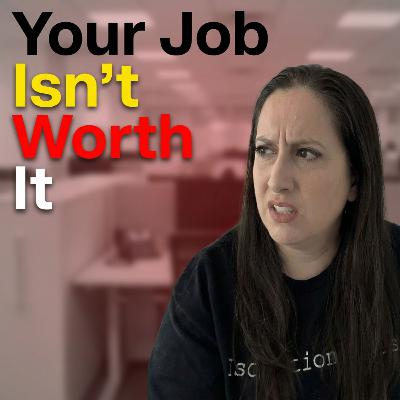
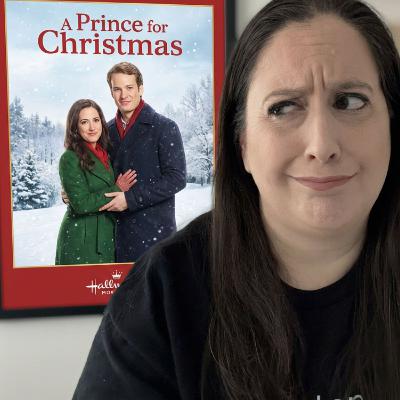
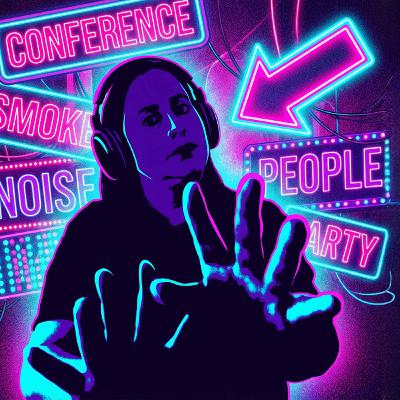
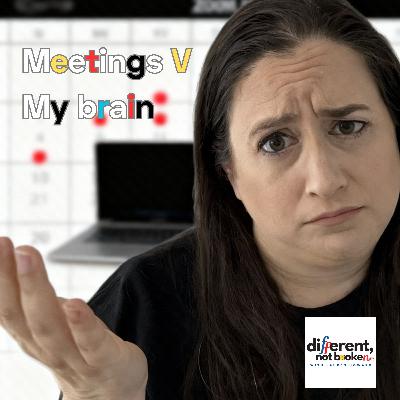

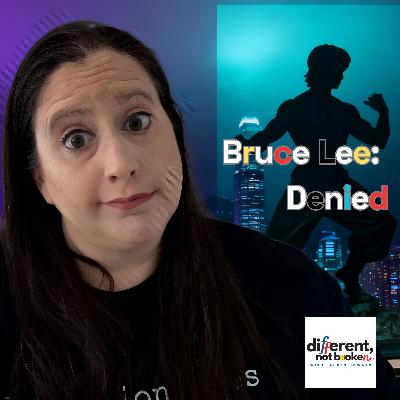
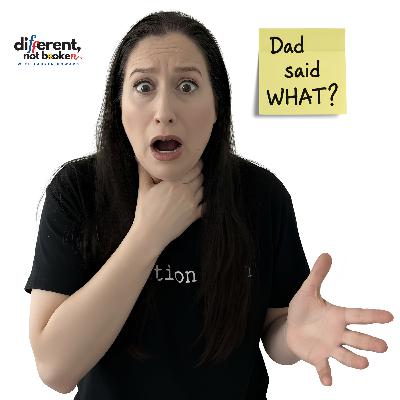
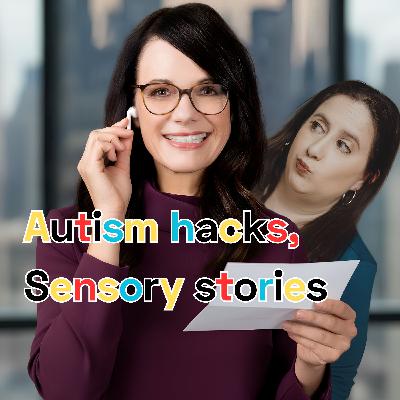


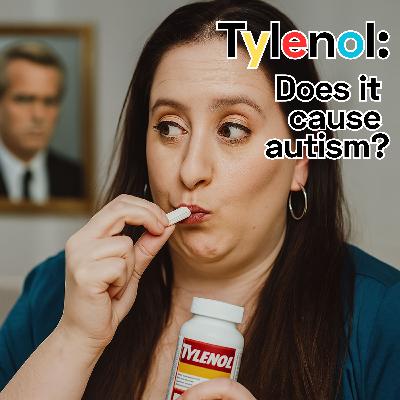

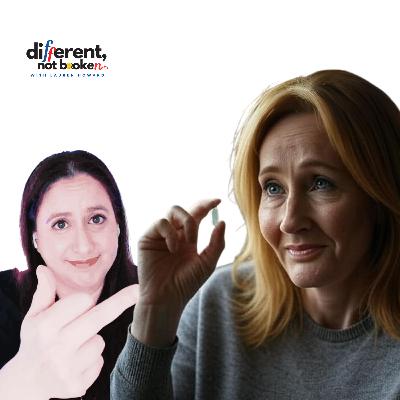



This is so delightful. Hearing a happy, hilarious human talk about their differentness was just what I needed today.